Just finished Richard J.F. Day’s new book Gramsci Is Dead: Anarchist Currents in the Newest Social Movements (Between The Lines: 2005). Day has written an important book, as inspirational as it is informative. It is intellectually gratifying to read a book that does so much, so concisely.
Day surveys the state of radical politics, but goes considerably deeper than merely cataloguing the myriad expressions of social opposition (from the Zapatistas to squatters to anti-globalization activists to radical queer, feminist and anti-racist movements). Gramsci Is Dead is also a fast but deep survey of very complicated philosophical arguments, especially the dense thickets of post-structuralism, post-modernism and autonomous Marxism (even something he calls postmarxism). The spine of his analysis, holding together the disparate theoretical threads that he critically examines, is his goal of finding the genealogy and current manifestation of an affinity for affinity, an increasingly influential politics that undermines the hegemony of hegemony.
Day is a careful reader of Gilles Deleuze, Jacques Derrida, Michel Foucault and many other recent and contemporary theoreticians, and makes good use of many of their insights. Happily he takes as his task to make their jargon-heavy concepts” that have so altered the political-theoretical environment in the past few decades” comprehensible to people not steeped in academia. One of his unique contributions is to apply the same scrutiny to the original writings of the icons of utopian socialism and anarchism, William Godwin, Robert Owen, Charles Fourier, Joseph Proudhon, Peter Kropotkin, Mikhail Bakunin.
After a quick tour of what he is calling the “newest” social movements, he spends a couple of chapters examining the ways classical liberalism and Marxism both reinforce a basic dependency by defining politics in terms of demand. Going further into this with Lacanian insights into desire, he helps us get a look at the incessant (and inherent) self-defeat of the left.
“Because they share an unconscious desire to perpetuate the desire for emancipation by extra-individual, extra-community structures of coercive power, (neo)liberalism and (post)Marxism can be said to participate in an ethics of desire, a set of principles and outlooks that perpetuate a self-imposed failure and provide a cover for the abdication of the difficult tasks associated with autonomous individual and communal self-determination.” (p. 84)
Day’s critique is meant to point us away from controlling centers of power, the hegemonic state or economy that logically is supposed to provide for us, to solve social problems.
“Without the hegemonic center articulated with apparatuses of discipline and control, there is no force to which demands might be addressed”¦ Going through the fantasy in this case means giving up on the expectation of a non-dominating response from structures of domination; it means surprising both oneself” and the structure” by inventing responses that preclude the necessity of the demand and thereby break out of the loop. This, I would argue, is precisely what is being done by the affinity-based networks of radical activism”¦ and what motivates the anti-integrationist elements of post-colonial, feminist and queer theories.” (p. 88-89)
In a chapter dedicated to re-examining utopian socialism in the 19th century, Day finds the logic of hegemony and the logic of affinity at work in the texts of early anarchists. Robert Owen and Charles Fourier both reveal tendencies towards integration, which Day calls the “poor cousin of affinity and the best friend of hegemony.” By this he means that politics that seek integration sound egalitarian and consultative at first but are fundamentally about subordination to a larger system, to a hegemonic logic. He also uncovers in early utopian writings ideas which today we would probably characterize as libertarian or even neoliberal, insofar as they accept the state, business, employees, and so on. Day chides us to read the original texts ourselves, because it turns out that successive generations of anarchist writers have tended to gloss over the writings in their predecessors that didn’t fit the latest ideological imperatives. (For instance, Kropotkin’s long-running essay on anarchism in the Encyclopedia Brittanica fails to note Bakunin’s emphasis on secret societies to foment the anarchist revolution, something that any contemporary anarchist would quickly recognize as vanguardist in the extreme.)
Day likes the early 20th century German anarchist Gustav Landauer’s approach. It allows for the possibility of co-existence with existing relations of oppression, but differs
“from reformism in that it does not provide positive energy to existing structures and processes in the hope of their amelioration. Rather, it aims to reduce their efficacy and reach by withdrawing energy from them and rendering them redundant. Structural renewal therefore appears simultaneously as a negative force working against the colonization of everyday life by the state and corporations, and as a positive force acting to reverse this process via mutal aid. Just as the states and capitalism advance by percolating into everyday relations, structural renewal proceeds through its own dispersion of regularities, its own viral infections and subtle transformations”¦ Landauer grasped the key insight of Foucault’s governmentality thesis” that we are not governed by “˜institutions’ apart from ourselves, by a “˜state’ set over against a “˜civil society’. Rather we all govern each other via a complex web of capillary relations of power.” (p. 124)
In this last point we get a premonitory explanation of contestation today. In the reproduction of our everyday lives, we reinforce relations that make us helpless. The new structure of capitalist work management depends on our helpless reproduction of the power of capital, on our inability to really break with the logic of subordination that is increasingly internalized into the worker’s own psychology rather than depending on the external coercion of a boss. Capital itself has digested the insights of Landauer and other earlier anarchists, and has worked to colonize us precisely in the “complex web of capillary relations of power.”
Day uncovers an updated discussion of this in the work of Michel Foucault:
“Foucault both locates his project within and takes it beyond classical anarchist theories of the state. It is within the anarchist tradition in the sense that he sees life without the state form as an ongoing actuality rather than an impossibility (as in liberalism), or as a utopian point to be reached in some far-off future (as in most marxisms). What takes it beyond classical anarchism is his disavowal of the possibility of living a life entirely without relations of power as domination”¦ just as there is no pure freedom, there is no pure domination.” (p. 137)
Like Day in his book, I am passing over complex ideas in far too cursory a manner to do them justice. But I want to give a sense of what his book covers, and why it’s a very compelling discussion. A less-known line of thought called “autonomous Marxism” gets a good summary in Gramsci Is Dead. It is a frame of reference that focuses on class struggle and sees that conflict as a driving force behind capitalist development, in addition to being its ultimate threat. Antonio Negri and Michael Hardt’s Empire in 2001, followed in 2004 by Multitude, are seminal texts for many. Negri and Hardt frame the concept of multitude as something of an extension of, or even a replacement for, the “proletariat” in classical Marxism. They see the multitude as the latest incarnation of the social subject that can bring down global capitalism, or Empire, but these “˜new’ subjects can do so not only in the negative sense, but also “˜express, nourish, and develop positively their own constituent projects.’ Day connects the constituent power of Negri and Hardt to the structural renewal advocated by some anarchists, experiments which undermine Empire by draining its energy and rendering it redundant. Paolo Virno is another theoretician of the “multitude” and like many other thinkers in this tendency, he sees “exodus” as a crucial act of revolt in this era. Virno defines exodus as “˜an engaged withdrawal’, a “˜founding leave-taking’ that consists in a “˜mass defection from the state’. I have argued for something similar with regard to Critical Mass, which I dubbed an “assertive desertion” (pdf) not from the state but from the ball and chain represented by cars and oil and debt.
Towards the end of his remarkable book, Day argues that exploring and understanding this concept of exodus is the most urgent task for radical theoretical practice. But he does not argue that as a universal prescription, precisely because his entire book is a polemic against universalizing any one strand of the many worthy lines of critique that coexist today. “You must trust in non-unified, incoherent, non-hegemonic forces for social change, because hegemonic forces cannot produce anything that will look like change to you at all.” (p. 155)
I think Richard Day must be in his early 30s or so, because he has fully digested the popular focus on white privilege and offers us a strange self-deprecating tone that tries to pre-emptively answer it. I can’t remember reading a book in which the author manages to write with so much intelligent insight, and yet apologizes so profusely for himself and his position in life:
“I identify myself as a White male university professor living and working in relative ease and comfort in a G8 country”¦ my struggles with oppression arise mostly from the need to challenge my own racism, heterosexism and classism, and to find more effective ways to be in solidarity with those who experience the debilitating effects of these apparatuses of division every day and night, throughout their lives.” (p. 11)””¦we need to begin to understand better how, as persons of relative privilege, we can work to demolish our privilege without asking the state to do it for us.” (p. 188)
“Infinite responsibility means always being ready to hear another other, a subject who by definition does not “˜exist’, indeed must not exist (be heard) if current relations of power are to be maintained. To respond means at least to have heard something” though one can never hear entirely “˜correctly’ or completely” and thus represents a crucial step on the way to avoiding the unconscious perpetuation of systems of division.” (p. 200)
“It will mean remembering that despite what may be a very real commitment to anti-oppression struggles, those of us who are privileged benefit from our positions in oppressive structures, primarily through not having to worry about the effects they have upon our own theory and practice. Infinite responsibility means being aware of this privilege and refusing/diffusing it to the greatest extent possible. More than anything, though, it means being willing to hear that you have not quite made it just yet, that you still have something more to learn.” (p. 201)
Obviously learning never stops, nor should listening. But I find this kind of self-critical rhetoric really bothersome. It feels either apologetic or condescending, and in any case, fails to come to grips with the fact that his own life, even in its relative material and psychological comfort, is severely stunted compared to what it might be in a world where the hierarchies and divisions he’s decrying were abolished. To dwell on his status as being privileged is to simultaneously reinforce the hierarchies of this society and to deny the real damage his own life is subjected to. It also fails to flip this whole concern away from the idea of “privilege,” which clearly connotes something that’s been granted and could (should?) be taken away, and reconfigure it as a question of rights. In other words, if it’s true that he has some kind of greater comfort materially and/or psychologically, shouldn’t it be the basic right of everyone to have the same (presuming of course that it is not inherently at the expense of others)? Moreover, given the incredible sensitivity and awareness he’s displaying, does he really need to be told by anyone that he “hasn’t quite made it yet”? That just seems ridiculous on the face of it.
Day is obviously fully engaged with the challenge of our time” to rethink politics based on what people are actually doing; to apply abstract theoretical insights to illuminate the deeper meaning and possibilities of real efforts that are underway. Gramsci Is Dead is stimulating, well-researched and generally well-written. I quibble with his adherence to the hyper-self-conscious guilt of so-called “privilege” but I will end with two last quotes that curiously undercut some of this very rhetoric.
“A politics of affinity… is about abandoning the fantasy that fixed, stable identities are possible and desirable, that one identity is better than another, that superior identities deserve more of the good and less of the bad that a social order has to offer, and that the state form should act as the arbiter of who gets what.” (p. 188)”Following in the footsteps… of those suffering the most from the depradations of globalizing capital] means that we of the global north must learn to meet our own needs locally, thereby limiting our participation in, and draining energy from the neoliberal order. To the extent that we succeed in doing this, we undermine our privilege and stand in solidarity with those who do not share it. Also, by providing alternatives for those who can and will join the exodus from the neoliberal order, we open ourselves to sharing what we have built. In both the long and short terms… more progressive social change can be achieved for more people by ridding ourselves of one of the final vestiges of the logic of hegemony, which is also traceable back to the Utopian socialists: the will to save everyone at once.” (p. 215).
Day has worked to link the insights of dense post-structuralist philosophers with the longterm trajectory of human liberation as described in the anarchist tradition. But it’s not just an abstract book of philosophy. He grounds his discussion in the new(est) social movements that many of us are deeply involved in, and he’s unabashed about advocating that we act without fear of being impure since everything is inevitably going to be short of perfection. The paradigms of 20th century politics are exhausted and we haven’t yet wrapped our heads around what that means. This book is a vital contribution to a growing body of work that is beginning to give a serious foundation for the explosions that will soon rock the early 21st century.


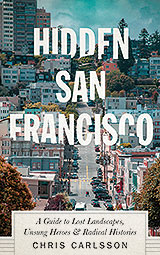

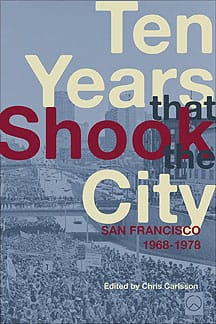

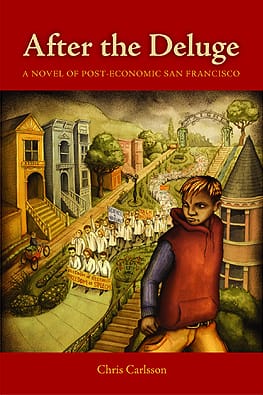
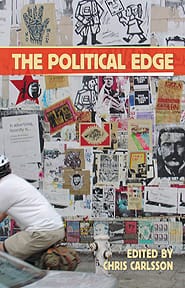
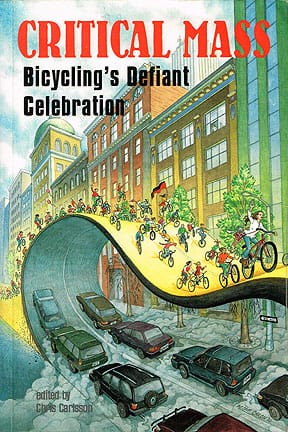
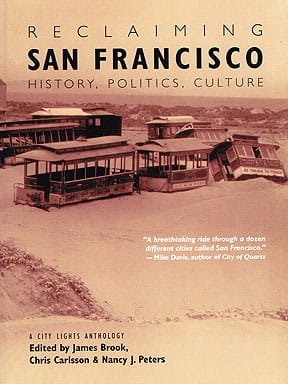
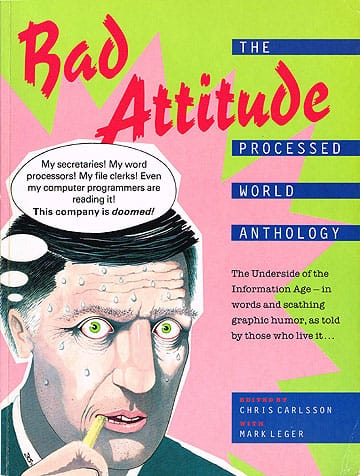

Oops! the url is: http://sketchythoughts.blogspot.com/2006/03/talking-about-revolution-reading.html
i have just written my own review of Gramsci Is Dead available on my Sketchy Thoughts blog – it is very much along the same lines as Gerry’s critique above.
Hi Chris,
Your review of Day
“Day’s critique..
to point us
away from controlling
centers of power,
the hegemonic state
or economy…”
is a focus on ‘power’
and a resistance..
where if
“power is something
that flows between one who
exercises control
and one who
resists”
then
here ‘resistance’ means
balanced fair criticism
in academic sense
or self education
self evolution
creativity
using resources…
approaching a marxian
utopia
here in usa
experiment in self government
most effective
for the individual
to overcome hegemonic
power
such resistance is also
difficult
like My asking
myself
why do I urge any other
kind of ‘resistance’
to hegemonic power?
what is the genealogy
of that desire I have?
what are the mentors of that?
I say
in celebration of recent
hearing
foucault lecture
at berkley (recording)
cura su ‘take care of yourself’
ironic
since he focused on ‘power’
(only showing the difficulty
of ‘taking care of self’)
here in usa
our great opportunity
to ‘take care of ourselves’
resist the “darlings of this world”
our mentors who suggest ‘resistance’